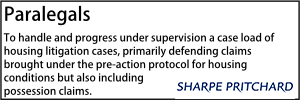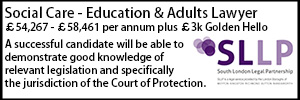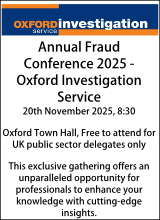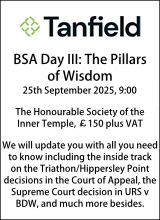
Legal Department of the Future: The stories behind the statistics
Excluded by definition: the narrow reading of “stepchild” and housing succession claims
Consistency in disciplinary processes
What the Epping Forest injunction case means for local authorities across England
Exclusions – lessons from the last academic year

New statutory guidance on RSHE
Tracking down the abducted ‘P’
What does the law say about hair strand testing?
Document experts in age assessment disputes: Ask the court’s permission, not its forgiveness
Navigating the Provider Selection Regime (Wales) Regulations 2025

Ethics and Integrity Commission: a new chapter in public standards oversight
Allocation of temporary accommodation, transfer lists and discrimination
Instruction of experts in housing disrepair claims
From Wikimedia to the wider web: What the High Court’s judgment means for the Online Safety Act 2023
The Health and Social Care (Wales) Act 2025 – eliminating profit from the care of looked after children
Inability to speak at a planning committee meeting and prejudice
Changes to the subsidy control statutory guidance August 2025
A new planning bill for Wales: What will this mean?
The landfill tax and local authorities
REMA Update: New direction for electricity market reform
FOI is a collateral attack on enforcement
The Legal Department of the Future and the Monitoring Officer
It was Darkest Before The Dawn
In ‘n’ Out – insourcing vs outsourcing
Town and village greens: landowner statements and regulatory failures by the CRA
Supreme Court clarifies cumulative approach to qualified exemptions under FOIA
Ofgem’s energy system cost allocation and recovery review – Proposed reforms and impact assessment
New requirements for Residential PEEPS (Personal Emergency Evacuation Plans)
Beware helpful judges (or Timeo judices et dona ferentes)
The path ahead for social housing
Re-evaluating Birmingham v Lee
Reforming the Right to Buy
The power of local authorities to set local energy efficiency standards
Preparation and conduct of public law children proceedings
The Office for Environmental Protection and local authorities
Flood risk and emerging Local Plans
Disordered eating and the gaps between services – the consequences for the Court of Protection
Mental health tribunals and 11(7) representatives
The Housing Ombudsman on ASB
The role of substitutes
The Cyber Security and Resilience Bill: key considerations
The Pensions Scheme Bill and the LGPS
Reasonable adjustments and the removal of disadvantage
Powering the future: Legal insight on driving demand for hydrogen in the UK
Commercial market operator principle clarified in CAT ruling on subsidy control challenge
Automatic suspensions and the public interest
Tim Care provides a summary of the recent case of Unipart Group Ltd v Supply Chain Coordination Ltd [2025], and assesses its impact upon the application of the Public Contract Regulations 2015 (PCR 2015).
- Details
The facts
The Defendant, Supply Chain Coordination Ltd (SCCL), conducted a competitive procurement exercise for the award of a major logistics contract intended to modernise NHS supply chain services. The contract was awarded to GXO Logistics UK Ltd (GXO) following a multistage tender process.
Unipart Group Ltd (Unipart), the incumbent supplier, and DHL Supply Chain Ltd (DHL), both unsuccessful bidders, brought legal challenges alleging breaches of the PCR 2015.
As a result of these challenges, the automatic suspension under Regulation 95 of the PCR 2015 came into effect, preventing SCCL from concluding the contract with GXO. SCCL applied to lift the suspension, prompting the Court to assess whether interim relief should remain in place pending trial.
The American Cyanamid Test
In determining whether to lift the suspension, the Court applied the four-limb American Cyanamid test:
- Whether there was a serious issue to be tried.
- Whether damages would be an adequate remedy for the claimants if the suspension were lifted.
- Whether damages would be an adequate remedy for the defendant if the suspension remained in place.
- Where the balance of convenience lay.
The judgement
Serious issue to be tried
The first question the Court must ask is whether the claim being brought has enough substance to warrant a full trial.
DHL alleged that a former SCCL executive assisted GXO (the winning bidder) in preparing their bid soon after leaving SCCL. DHL claimed that SCCL mishandled this potential conflict of interest and failed to treat bidders equally. The Court agreed this was a serious allegation to justify a full hearing.
Unipart brought two separate sets of legal proceedings against SCCL relating to the same NHS logistics procurement process:
- The First Claim – Challenge to Exclusion from the Process
Unipart was excluded at an early stage of the procurement process. It challenged this exclusion on grounds including errors in evaluation and unfair treatment. However, Unipart did not apply for an injunction at this stage. - The Second Claim – Challenge to the Award Decision
After SCCL awarded the contract to GXO, Unipart issued a second legal claim. This focused on SCCL’s failure to provide proper information in the Contract Award Notice, such as the reasons for awarding the contract to GXO and GXO’s scores. This, Unipart argued, breached Regulation 86 of the Public Contracts Regulations 2015, which requires certain disclosures to all eligible tenderers.
SCCL argued that Unipart should not be allowed to challenge the award decision because it had already been excluded earlier in the process and had not sought to suspend the procurement at that time. In SCCL’s view, Unipart had ‘missed its chance’.
The Court held that because Unipart’s exclusion had not yet been ruled lawful by the Court, Unipart remained entitled to be notified of the award decision and the reasons for it. Therefore, Unipart’s second claim, focusing on transparency and fairness at the contract award stage, raised serious legal questions that should be fully heard at trial.
Adequacy of damages for the Claimants
This part of the test asks whether financial renumeration would be enough to compensate for the harm caused if the Court allows the contract to be awarded and the claimant later wins their case.
For DHL, the Court found that damages would be an adequate remedy. DHL failed to provide specific evidence of irrecoverable reputational or financial loss. The judge noted in particular that DHL’s performance and profitability had remained robust following its previous loss of the NHS contract in 2018.
Unipart, in contrast, was found to be in a more vulnerable position. As the incumbent provider and a smaller market player, Unipart was more exposed to the reputational and commercial consequences of losing the contract. Although the Court was not wholly convinced by the strength of Unipart’s evidence, it accepted—just—that damages might not be an adequate remedy and that there was a real risk of irreparable harm.
Adequacy of damages for SCCL
The Court accepted SCCL’s argument that damages would not be an adequate remedy if the suspension were maintained. The contract formed part of a wider NHS transformation initiative, including the critical “Project Tokyo” IT modernisation programme.
SCCL had provided evidence that reliance on the current NHS IT system (RESUS) posed serious risks to supply chain operations. The Court accepted that further delay in implementing the new contract would pose operational and public interest risks that damages could not remedy.
Balance of convenience
In the final stage, the Court must balance the competing harms in lifting the suspension and decide which option causes less overall risk or injustice.
Ultimately, the Court held that the balance of convenience strongly favoured lifting the suspension. While Unipart’s claim just passed the adequacy of damages threshold, the broader risks to NHS logistics and the public interest in progressing Project Tokyo outweighed the potential harm to Unipart.
The Court therefore granted SCCL’s application and lifted the automatic suspension, enabling the contract to be awarded to GXO. However, the procurement challenge brought by Unipart and DHL will still proceed to trial, albeit without interrupting the rollout of the new logistics arrangements.
What this means
The decision confirms that the courts are willing to lift an automatic suspension where there are compelling public interest justifications for doing so.
This case also remains relevant when applying the new procurement regime under the Procurement Act 2023, as Section 102 states that the courts should have regard to the public interest in (among others) avoiding delay in the supply of the goods, services or works provided for in the contract being procured.
However, to avoid legal challenge, authorities should ensure that they maintain robust procurement records and manage potential conflicts of interest carefully.
Tim Care is a partner at Ward Hadaway.
Senior Lawyer - FCRM & Planning Team
Police Misconduct & Vetting Solicitor
Lawyer - Property
Solicitor or Chartered Legal Executive
Lawyer - Area FCRM and Planning Team
Locums
 Business and Property Masterclass #5: Interim Relief – Acting urgently and getting it right - Cornerstone Barristers
Business and Property Masterclass #5: Interim Relief – Acting urgently and getting it right - Cornerstone Barristers
10-09-2025 11:00 am
Online (live)
 Business and Property Masterclass #6: Rights of Light and Restrictive Covenants - Cornerstone Barristers
Business and Property Masterclass #6: Rights of Light and Restrictive Covenants - Cornerstone Barristers
23-09-2025
Online (live)
 Institutional landlord series: Possession – High Court Enforcement - 5 Pump Court
Institutional landlord series: Possession – High Court Enforcement - 5 Pump Court
22-10-2025 4:00 pm
Online (live)
 Institutional landlord series: Costs Recovery and Legally Aided Parties - 5 Pump Court
Institutional landlord series: Costs Recovery and Legally Aided Parties - 5 Pump Court
05-11-2025 4:00 pm
Online (live)
 HMPL Building Blocks: Tenancy Management – Assignment, Mutual Exchange and Succession - Devonshires
HMPL Building Blocks: Tenancy Management – Assignment, Mutual Exchange and Succession - Devonshires
12-03-2026
Online (live)
 Unpicking the Procurement Act Episode 2: Exclusion and Debarment - 39 Essex Chambers
Unpicking the Procurement Act Episode 2: Exclusion and Debarment - 39 Essex Chambers
On Demand
Online (pre-recorded)
 Unpicking the Procurement Act Episode 1: Overview and New Procedures - 39 Essex Chambers
Unpicking the Procurement Act Episode 1: Overview and New Procedures - 39 Essex Chambers
On Demand
Online (pre-recorded)
 Unpicking the Procurement Act Episode 3: Contract Modification - 39 Essex Chambers
Unpicking the Procurement Act Episode 3: Contract Modification - 39 Essex Chambers
On Demand
Online (pre-recorded)
 Unpicking the Procurement Act Episode 4: Challenges and Remedies - 39 Essex Chambers
Unpicking the Procurement Act Episode 4: Challenges and Remedies - 39 Essex Chambers
On Demand
Online (pre-recorded)
























































 Executive Programme in Public Procurement Law and Policy - University of Nottingham
Executive Programme in Public Procurement Law and Policy - University of Nottingham  Net Zero Summit - Sharpe Pritchard
Net Zero Summit - Sharpe Pritchard  Property Law Roadshow 2025 - Bristol - St John's Chambers
Property Law Roadshow 2025 - Bristol - St John's Chambers  CUBAS Comprehensive Training & Licencing (Manchester), September 2025
CUBAS Comprehensive Training & Licencing (Manchester), September 2025  AI in the Public Sector Conference - Westminster Insight
AI in the Public Sector Conference - Westminster Insight  Activism in the Workplace - 42BR Barristers Employment Law Annual Lecture
Activism in the Workplace - 42BR Barristers Employment Law Annual Lecture  DoLS Authoriser Training - LPS Law
DoLS Authoriser Training - LPS Law  Property Law Roadshow 2025 - Cardiff - St John's Chambers
Property Law Roadshow 2025 - Cardiff - St John's Chambers  Annual Fraud Conference 2025 - Oxford Investigation Service
Annual Fraud Conference 2025 - Oxford Investigation Service  Ivy Legal - Certificate in Planning Enforcement
Ivy Legal - Certificate in Planning Enforcement